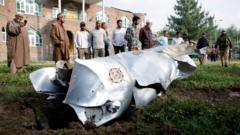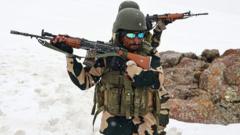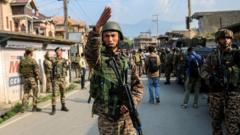India executed missile and air strikes on multiple sites in Pakistan, claiming to target militant positions linked to recent attacks. Pakistan has since claimed to have downed Indian jets in response, prompting fears of an escalating conflict between the two nuclear-armed nations.
Tensions Rise as India Launches Air Strikes on Pakistan: What’s Next?

Tensions Rise as India Launches Air Strikes on Pakistan: What’s Next?
The recent air strikes by India on militant targets in Pakistan have escalated tensions, raising questions about possible retaliatory actions from Islamabad.
In a significant escalation of hostilities, India conducted missile and air strikes on nine sites in Pakistan and Pakistan-administered Kashmir, targeting militant positions based on "credible intelligence." The strikes, lasting 25 minutes in the early hours of Tuesday, reportedly left residents reeling from the explosions. While India asserts that its air strikes struck crucial strongholds of designated militant groups, Pakistan has contested the claims, insisting that only six locations were impacted and proclaiming to have successfully shot down five Indian fighter jets along with a drone.
The tensions escalated following a deadly militant attack on tourists in Pahalgam, Jammu and Kashmir, which India has linked to Pakistan-based terror groups. Despite these grave accusations, Pakistan has vehemently denied involvement, criticizing India for failing to provide evidence supporting its claims.
This wave of air strikes appears to mark a shift in India's military strategy, expanding the scope of its targets beyond traditional patterns. The operation included targeted assaults on prominent hubs of groups such as Lashkar-e-Taiba, Jaish-e-Mohammed, and Hizbul Mujahideen, with strikes occurring deeper into Pakistan's territory than in previous engagements. According to analysts, the intent seems to re-establish deterrence against Pakistan, with some drawing parallels to Israel's approach of maintaining a military presence and action as a form of deterrent.
Experts suggest that retaliation from Pakistan is imminent as its military faces internal pressures to respond decisively. Some have warned that surgical strikes from both sides could escalate into a more extensive, conventional conflict if not carefully managed. The prevailing sentiment among military and political analysts is that heightened diplomatic efforts will be necessary to prevent further escalation.
Despite the risk, some experts believe that the situation could stabilize with minor reciprocal actions, but the reality is that tensions remain high. Pakistan's political backdrop complicates the situation further; the military is experiencing a credibility crisis amid public dissatisfaction, presenting a dual challenge of possible military action to restore national unity and the need for restraint to avoid an escalating conflict.
India's subsequent actions—such as suspending diplomatic relations and restricting movements across borders—in the wake of heightened tensions reflect a calculated approach amidst the precarious balance of power. The recent conflict reflects a cycle reminiscent of past crises, where diplomatic negotiations are crucial to de-escalation and conflict resolution.
In summary, as the situation unfolds, the international community watches warily, hoping that history will guide both nations away from the brink of broader conflict.





















